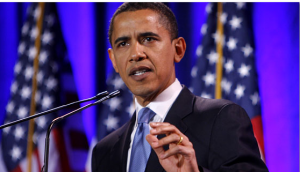Ever since Barack Obama moved his family into the White House and assumed duties as leader of the free world, blacks across the country have winced at the idea of criticizing the first black man to occupy the Oval Office.

To hold the title of President of the United States of America as a black man is something that many thought they would never see. For many, Obama represents a payoff for the lives that were lost and the blood that was shed on the streets of many American cities just so black folk would receive the opportunity to participate in democracy.
What Obama embodies is sacred ground for many, and to criticize him is just about as close to blasphemy as one can get.
But is that dangerous political ground for black people?
I’ll give an example.
Last week, Congressman Emanuel Cleaver said that if Obama were not president, he and members of the Congressional Black Caucus, a group that Cleaver chairs, would “probably be marching on the White House,” if a white guy in Obama’s position failed to address issues afflicting the black community.
That is a healthy and politically sobering observation to publicly make for Cleaver. He is in a no win situation as head of the CBC.
If he publicly lambastes the president, he’s seen as someone who obstructs and gives more ammunition to Obama’s enemies. If he tows the party and racial line for Obama, he’s seen as a lap dog, for lack of a better term.
Personally, I find Cleaver’s admission refreshing and needed.
The unemployment rate for black people nationwide is over 14 percent, there is a crime crisis going on in the Midwest where many young black men and women are losing their lives every day and black men are being shipped off to prisons at an alarming rate.
Why shouldn’t Obama address these issues?
For me, I feel Cleaver’s pain. I have chastised the president on some issues, such as his use of drones overseas and his approval of the National Defense Authorization Act. For that, I have been personally and politically chided.
Nevertheless, I believe we are finally reaching a new point in black political theatre and consciousness. If Obama is re-elected, which I do have a hope that he will be, black people should and will take a different position regarding his policies.
There is no reason that Congress and Obama shouldn’t work together to bring about targeted policies to drive down the unemployment rate for black people, aide in stopping the unconscionable amount of murders happening in the Midwest and create new programs aimed at creating new economic opportunities for minorities.
But that goes for any man or woman who wants to be leader of the United States, and the color of that person’s skin shouldn’t matter.
Our next step must be to move beyond the captivity of pigmentation politics. If Obama deserves to be called out for doing something wrong or for supporting a policy not conducive to our growth as a community, it is ok to say it without fear of being criticized.
The political survival of the black community may hinge on our ability to be multi-dimensional in our assessment of Obama’s performance. It is not ok to criticize just to say one did so as to appease a certain audience.
There must be an acute appraisal, not one steeped in extreme ignorance or dogmatic negativity.
It is ok to love Obama and chastise him at the same time. Let’s just make sure we aren’t admonishing everyone who decides to take part in this practice.
-JH



The Republicans have been successful in achieving their vision because they have stayed aligned. No dissent was tolerated by the leadership. They have stayed on their message and repeated it so much that low information people assume it to be true. On the other hand, the dems have behaved as a herd of cats with each constituency crying ” what about me?”. If he were perceived now as catering to black folk, he would lose much support fron the other members of his base and probably would lose in a landslide. If he gets re-elected, that would be the time to push for more support of our agenda.